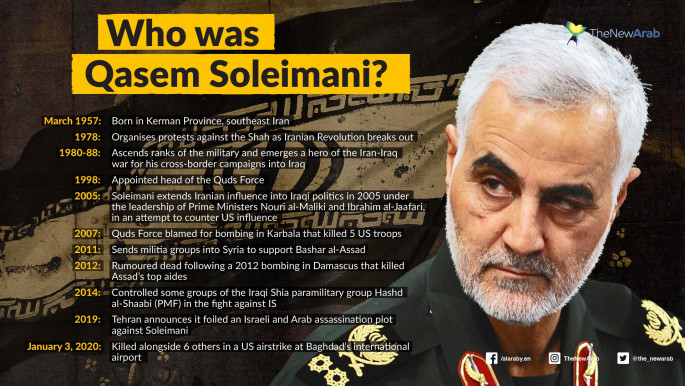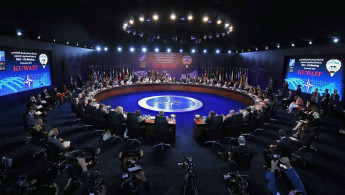NATO ambassadors scramble to address US-Iran escalation
NATO ambassadors will meet at their Brussels headquarters on Monday as tensions continued to flare in the Middle East over the US assassination of a top Iranian general.
"[The] Council will address the situation in the region," a NATO official said.
"The secretary general decided to convene the meeting of NATO ambassadors following consultations with allies."
The move came after widespread anger of the killing of Soleimani and Iraqi paramilitary leader Abu Mahdi al-Muhandis on Friday, which triggered fears of a war between the US and its arch-enemy Iran.
Soleimani was Iran's most powerful military commander, directing large-scale operations in Syria, Iraq and across the Middle East.
Muhandis, the Hashd al-Shaabi's deputy leader, helped found Kataib Hezbollah in Iraq.
Tehran has vowed to avenge the commander, and US President Donald Trump has threatened "major retaliation" if any American targets are hit.
The assassinations angered Baghdad, which has since 2003 grown closer to its Iranian neighbour.
Iraq's parliament passed a resolution on Sunday calling on the government to expel all foreign troops in the country.
"The parliament has voted to commit the Iraqi government to cancel its request to the international coalition for help to fight IS," speaker Mohammed Halbusi announced.
Earlier on Sunday, Iraq said it had submitted complaints to the United Nations Security Council over US strikes on Iraq that killed the commanders.
Comment: Soleimani assassination spells trouble for Iraqis, Iranians and the region
The foreign ministry said it had submitted two letters to the UN and asked the Security Council to condemn the "assassination" of Iranian Major General Qasem Soleimani in an American drone strike on Baghdad.
The Iraqi foreign ministry also said it summoned US ambassador Matthew Tueller to condemn the American strikes.
"They were a blatant violation of Iraqi sovereignty," the ministry said in a statement, and "contradict the agreed-upon missions of the international coalition".
 |
NATO maintains a training mission in Iraq, preparing local forces to take on Islamic State group militants, but this would be in doubt if coalition forces pull out.
'Suspended'
On Saturday, a NATO spokesman said the mission, which involves several hundred allied personnel, was continuing "but training activities are currently suspended".
He also confirmed that NATO Secretary General Jens Stoltenberg had spoken by telephone with US Secretary of Defence Mark Esper since Friday's strike.
The halt in operations followed a similar decision by the US-led coalition in Iraq which announced a suspension to the training of Iraqi forces on Friday, according to a German military letter.
US Lieutenant General Pat White's decision aimed to provide an extra level of protection for American troops in the country amid widespread fears of an Iranian retaliation to the killing of Soleimani, a senior German officer said in the letter to lawmakers in Berlin.
"Thus, the training for the Iraqi security and armed forces throughout Iraq is temporarily suspended," German Lieutenant General Erich Pfeffer wrote to members of the Bundestag defence and foreign relations committees in the letter, Reuters reported.
"The directive is binding for all partner nations involved in OIR at the training sites in Iraq," he added, referring to forces deployed in Iraq under Operation Inherent Resolve (OIR), which he commands.
Around 120 German troops are involved in the US-led OIR operation in Iraq.
Early on Saturday, German Greens politician Omid Nouripour said German soldiers should be immediately extracted from Iraq due to a lack of security guarantees.
"The risk of an escalation is very high," he said, warning that Iran's armed forces could "hit the Americans and us, as their allies, massively",
Nouripour also suggested in an interview with DW the need to revive "any imaginable mechanism of crisis diplomacy", including sending Germany's foreign minister to Tehran, Riyadh, Doha and Ankara "to prevent an overreaction to a potential Iranian overreaction".





 Follow the Middle East's top stories in English at The New Arab on Google News
Follow the Middle East's top stories in English at The New Arab on Google News


